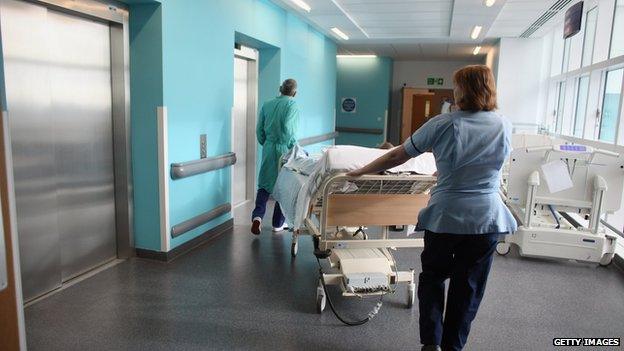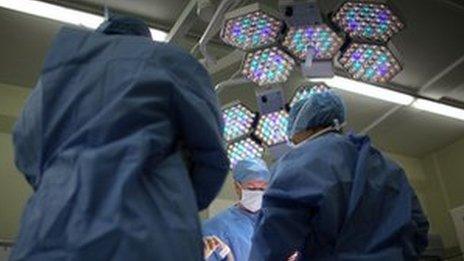Hospital charges to rise for non-EU patients
- Published

Visitors from outside the EU who receive treatment in NHS hospitals in England are now being charged 150% of the cost under changes brought in to discourage "health tourism".
Non-EU citizens settling in the UK for longer than six months are also being required to pay a "health surcharge" as part of their visa applications.
The new rules, external from the Department of Health came into force on 6 April.
Primary care and A&E care continues to remain free.
Permanent residents of 32 European countries qualify for NHS treatment, which is then billed to their country of residence, but this new ruling applies to foreign migrants or visitors based in other countries, mainly those outside the EU.
These patients can be treated in an NHS hospital but are expected to repay the cost of most procedures afterwards.
But up to now, the DoH has only sought to reclaim the actual costs, without adding any extra charges.
The DoH hopes the changes will help it recoup up to £500m a year by 2017-18.

Analysis
Hugh Pym, health editor, BBC News
The new guidelines do not require patients on trolleys in hospitals to produce passports before getting access to urgent care. Nor do they apply to accident and emergency or a visit to a GP.
What is covered is ongoing treatment on the NHS after an initial diagnosis or referral - for example an outpatient appointment.
The Department of Health is incentivising hospitals to be more vigilant in checking patient credentials by allowing them to charge more for treatment of people "not ordinarily resident" in the UK.
The department can recoup those costs from the patient's member state if they are from the European Economic Area.
In the paperwork filled in by the patient before the appointment they will be asked for proof they are "ordinarily resident".
This could be a utility bill, national insurance number or passport details. Some hospitals were doing this already but many were not.
The guidelines are designed to increase the chances that the treatment costs for a non-UK resident can be recovered. Critics may ask why it has taken so long for the initiative to be launched.

The charges are based on the standard tariff for a range of procedures, ranging from about £1,860 for cataract surgery to about £8,570 for a hip replacement.
Similar charges can be imposed by the NHS in Northern Ireland, Scotland and Wales for hospital care received by non-EU residents.
Exemptions
Patients using hospital services have been required to show their passports and other immigration documents if their UK residence status was in doubt.
The "health surcharge" on visa applications for non-EU citizens comprises an annual fee of £200-a-year, which is reduced to £150 for students.
Certain individuals, such as Australian and New Zealand nationals, are exempt from the surcharge.
And non-EU citizens who are lawfully entitled to reside in the UK and usually live in the country will be entitled to free NHS care as they are now.
Andrew Bridgen, the Tory MP for North West Leicestershire in the last Parliament, told the Daily Mail, external: "This is not the International Health Service, it's the National Health Service.
"Non-UK nationals seeking medical attention should pay for their treatment.
"The NHS is funded by UK taxpayers for UK citizens and if any of us went to any of these countries we'd certainly be paying if we needed to be treated."
Dr Mark Porter of the British Medical Association questioned the feasibility, saying a doctor's duty was to "treat the patient that's in front on them, not to act as border guard".
- Published14 July 2014

- Published3 July 2013
